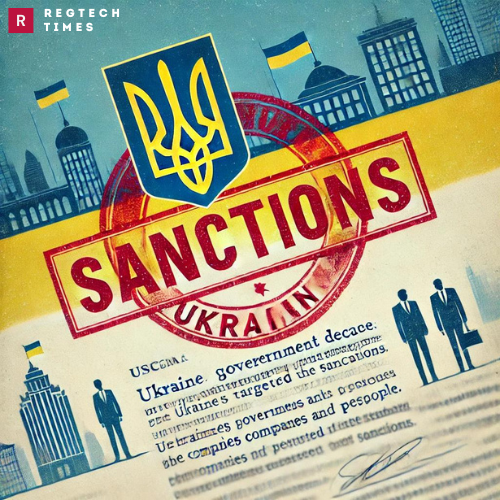In a decisive step to protect Ukraine’s national interests, President Volodymyr Zelensky enacted new Ukraine sanctions on October 5, 2024. The sanctions target three individuals and 18 companies as part of the country’s broader efforts to counter threats from Russian influence and hybrid warfare tactics. The decision, authorized by the National Security and Defense Council of Ukraine (NSDC), introduces restrictive measures that will remain in effect for three years. This development highlights Ukraine’s ongoing struggle to secure its sovereignty and block pro-Russian actors from destabilizing the country.
Details of the Ukraine Sanctions
According to Presidential Decree No. 692/2024, the Ukraine sanctions apply to three individuals: Alexander Ackst, Valeriy Falkovsky, and Vladyslav Studenets. While specific information about their activities remains undisclosed, they are believed to be involved in operations that pose a direct or indirect threat to Ukraine’s sovereignty.
In addition to these individuals, 18 limited liability companies (LLCs) operating in Ukraine have been placed under sanctions. These companies include German Logistics Service, Torg Invest Event, Alpha Galaxy, Rains Trading Group, and Lennox Trading, among others. Many of these entities are involved in logistics, trading, and construction, and their operations are now restricted by the Ukraine sanctions.
The sanctions involve asset freezes, a prohibition on business activities, and restricted access to financial services within Ukraine. These measures aim to sever any potential support these companies and individuals may provide to destabilizing activities or pro-Russian efforts.
Significance of the Sanctions for Ukraine’s Security
The latest Ukraine sanctions are a continuation of the country’s efforts to defend itself against both internal and external threats. Since the start of the conflict with Russia in 2014, following Russia’s annexation of Crimea, Ukraine has faced ongoing challenges not only on the battlefield but also in the economic and informational arenas. Russia’s hybrid warfare tactics—cyberattacks, disinformation, and economic pressure—have been a key strategy to weaken Ukraine from within. These new sanctions aim to counter such threats by targeting companies and individuals who may be involved in supporting these efforts.
By cutting off access to resources, the Ukraine sanctions are designed to disrupt logistical and financial networks that could potentially facilitate Russian influence. This is particularly important as the war with Russia continues to evolve into more complex and multifaceted forms of conflict, beyond traditional military engagement.
Integral Concierge Services Fined for Breaching Ukraine-Related Sanctions
International Cooperation and the Role of the EU
The timing of these Ukraine sanctions is also noteworthy. They come just after the European Union approved a new sanctions mechanism aimed at countering Russia’s hybrid actions, such as cyberattacks and disinformation campaigns. The EU’s new approach is part of a broader effort to protect Europe and its allies from Russia’s increasingly sophisticated and asymmetric strategies.
Ukraine’s decision to impose these sanctions demonstrates its alignment with European partners, particularly in confronting Russia’s tactics. By working in tandem with the EU, Ukraine is bolstering its defense not only through military support but also via economic and diplomatic measures. The Ukraine sanctions send a clear message that Kyiv, with international backing, is committed to resisting Russian aggression in all its forms.
Economic Warfare: A Key Part of Ukraine’s Defense
In the modern landscape of conflict, sanctions have emerged as one of the most powerful tools to combat hostile actions without direct military engagement. Ukraine’s sanctions are a form of economic warfare aimed at choking off the financial and logistical channels that sustain Russian hybrid warfare activities.
By targeting companies such as German Logistics Service and Alpha Galaxy, which operate in critical sectors like trading and logistics, the Ukraine sanctions seek to limit the reach of those who could be helping to destabilize the nation. These moves are not just symbolic; they have real consequences for businesses and individuals involved in undermining Ukraine’s stability.
The latest round of Ukraine sanctions imposed by President Zelensky reflects the country’s ongoing commitment to safeguarding its sovereignty amid constant pressure from Russia. By targeting individuals and companies suspected of supporting pro-Russian activities, the Ukrainian government is taking proactive steps to curb external influence and hybrid warfare tactics.
These sanctions are not only about punishing specific actors; they are part of a broader strategy to defend Ukraine from both visible and invisible threats. As Ukraine continues to stand firm against Russian aggression, its ability to combine military, economic, and diplomatic tools in coordination with international partners like the EU will be crucial to maintaining its independence and security.
In this context, the Ukraine sanctions serve as a key component of the country’s defense strategy, proving that economic measures can play an essential role in the broader fight to protect national interests and resist external threats.


